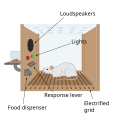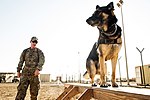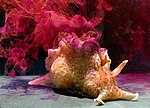Operant conditioning, also called instrumental conditioning, is a learning process where voluntary behaviors are modified by association with the addition...
67 KB (8,836 words) - 12:56, 5 June 2024
chamber can be used to study both operant conditioning and classical conditioning. Skinner created the operant conditioning chamber as a variation of the...
16 KB (1,801 words) - 10:43, 6 April 2024
salivated when fed red meat. Pavlovian conditioning is distinct from operant conditioning (instrumental conditioning), through which the strength of a voluntary...
65 KB (8,707 words) - 11:59, 9 July 2024
Reinforcement (redirect from Operant reinforcer)
to relieve a headache. Reinforcement is an important component of operant conditioning and behavior modification. The concept has been applied in a variety...
73 KB (9,513 words) - 14:41, 8 June 2024
B. F. Skinner (section Operant conditioning chamber)
operant conditioning to strengthen behavior, considering the rate of response to be the most effective measure of response strength. To study operant...
77 KB (9,492 words) - 00:33, 22 June 2024
Learning (section Operant conditioning)
after the completion of the wanted behavior. Operant conditioning is different from classical conditioning in that it shapes behavior not solely on bodily...
79 KB (9,953 words) - 02:47, 14 July 2024
Behaviorism (section Operant conditioning)
the S-delta. Although operant conditioning plays the largest role in discussions of behavioral mechanisms, respondent conditioning (also called Pavlovian...
88 KB (10,419 words) - 07:35, 13 July 2024
Instinctive drift (section Operant conditioning)
failure of conditioning theory." B.F. Skinner was an American psychologist and father of operant conditioning (or instrumental conditioning), which is...
12 KB (1,482 words) - 20:21, 12 June 2024
that applies approaches based upon the principles of respondent and operant conditioning to change behavior of social significance. It is the applied form...
101 KB (11,893 words) - 04:36, 1 July 2024
Extinction (psychology) (redirect from Operant extinction)
observed in both operantly conditioned and classically conditioned behavior, which manifests itself by fading of non-reinforced conditioned response over...
31 KB (3,861 words) - 15:47, 27 March 2024
Radical behaviorism (section Operant psychology)
these and similar behaviors, called "operants", come about. Roughly speaking, in operant conditioning, an operant is actively emitted and produces changes...
14 KB (1,657 words) - 08:10, 30 May 2024
conditioning, a two-step process in classical conditioning Covert conditioning, classical and operant conditioning in mental health treatment Operant...
2 KB (320 words) - 17:36, 9 October 2021
significant difference in their motivations to purchase fashion items. Operant Conditioning theory is a well-known theory that also deals with hedonic processes;...
14 KB (1,962 words) - 20:26, 10 February 2022
can be seen in operant conditioning. Where, depending on reinforcement and punishment of a particular behavior, a response is conditioned. In accordance...
14 KB (1,879 words) - 08:34, 16 August 2023
Social norm (section Operant conditioning)
Skinner, who states that operant conditioning plays a role in the process of social norm development. Operant conditioning is the process by which behaviours...
69 KB (8,399 words) - 02:46, 11 July 2024
Dog training (section Operant conditioning)
its behavior is modified through habituation or sensitisation; and operant conditioning, where it forms an association between an antecedent and its consequence...
93 KB (10,744 words) - 05:55, 28 June 2024
Aplysia (section Operant conditioning)
can be transferred by RNA. Operant conditioning is considered a form of associative learning. Because operant conditioning involves intricate interaction...
28 KB (2,920 words) - 16:12, 14 June 2024
Association (psychology) (section Operant conditioning)
is the basis for learning. This learning is seen in classical and operant conditioning.[citation needed] Edward Thorndike did research in this area and...
18 KB (2,446 words) - 22:10, 23 May 2024
of operant conditioning, both in the laboratory and in behavior therapy. In classical or respondent conditioning, a neutral stimulus (conditioned stimulus)...
11 KB (1,410 words) - 20:44, 2 July 2024
Self-control (section Operant conditioning)
control. Alcohol impairs self-control. Operant conditioning, sometimes referred to as Skinnerian conditioning, is the process of strengthening a behavior...
66 KB (8,392 words) - 07:12, 19 June 2024
Pain in invertebrates (section Operant conditioning)
each period, demonstrating operant conditioning. A fly-controlled heat-box has been designed to study operant conditioning in several studies of Drosophila...
88 KB (9,956 words) - 00:24, 29 June 2024
Latent learning (section Operant conditioning)
from the other learning theories such as operant conditioning or classical conditioning. Classical conditioning is when an animal eventually subconsciously...
15 KB (2,125 words) - 21:19, 27 March 2024
eventually replaced by the terms "reinforcing" and "punishing," when operant conditioning became known. "Satisfying" and "dissatisfying" conditions are determined...
10 KB (1,502 words) - 20:05, 27 April 2024
In behavioral psychology, stimulus control is a phenomenon in operant conditioning that occurs when an organism behaves in one way in the presence of a...
11 KB (1,423 words) - 08:15, 26 November 2023
types of conditioning in different ways. The most generally used way by B. F. Skinner constructively considered classical conditioning and operant conditioning...
36 KB (4,664 words) - 17:08, 15 February 2024
Bedwetting alarm (section Operant conditioning)
This suggests that the conditioning treatment may follow the operant avoidance conditioning rather than the classical conditioning pattern. In addition...
12 KB (1,718 words) - 00:07, 14 July 2024
techniques based on behaviorism's theory of learning: respondent or operant conditioning. Behaviourists who practice these techniques are either behaviour...
59 KB (7,441 words) - 22:38, 9 May 2024
most important of these are classical conditioning and operant conditioning. In classical (or respondent) conditioning, behavior is understood as responses...
108 KB (14,237 words) - 18:48, 1 June 2024
on learning theory that resulted in operant conditioning within behaviorism. His theory of operant conditioning is learning from the consequences of...
37 KB (4,723 words) - 21:19, 6 March 2024
form of classical conditioning (Pavlovian conditioning) and operant conditioning (instrumental conditioning). In classical conditioning, a reward can act...
103 KB (12,754 words) - 16:50, 24 June 2024








